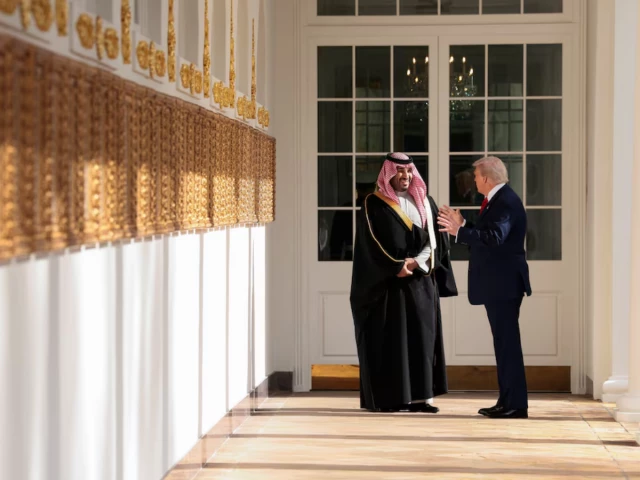Trump said he was “taking our military cooperation to even greater heights” by granting the designation to Saudi Arabia.
U.S. President Donald Trump and Saudi Crown Prince and Prime Minister Mohammed bin Salman speak under the colonnade of the White House in Washington, DC, United States, November 18, 2025.
President Donald Trump designated Saudi Arabia as a major non-NATO ally on Tuesday, renewing a decades-old strategic partnership as the two countries signed sweeping deals on arms sales, civilian nuclear cooperation, artificial intelligence and critical minerals.
This designation marks a return to traditional ties between the United States and Saudi Arabia. Although it does not offer the mutual defense guarantees that NATO members enjoy, it grants the kingdom significant economic, military and defense advantages, a status that the United States reserves for countries of strategic importance outside the Atlantic alliance. Pakistan received this designation from Bush after September 11, 2004.
The meeting underscored Trump’s determination to prioritize ties between the world’s largest economy and its top oil exporter, even as international outcry over the 2018 killing of journalist Jamal Khashoggi gradually faded from diplomatic discourse.
Trump said he was “taking our military cooperation to even higher levels” by granting the designation to Saudi Arabia, adding that U.S. strikes on Iran’s nuclear facilities in June had made the kingdom more secure.
Saudi Arabia paid a high price for this honor, becoming the 20th country on the list. As part of a strategic defense agreement that “strengthens deterrence across the Middle East,” Riyadh has committed to providing new burden-sharing funds to offset U.S. costs while making it easier for U.S. defense companies to operate in the kingdom.
The two countries also completed negotiations on civil nuclear energy cooperation, which the White House described as the legal basis for a long-term nuclear energy partnership – an agreement that has raised concerns among nonproliferation experts given Saudi Arabia’s previous statements about the possibility of acquiring nuclear weapons.
Crown Prince Mohammed bin Salman has pledged to increase Saudi investments in the United States to $1 trillion, a sharp increase from an earlier commitment of $600 billion.
The deals represent a significant diplomatic victory for Trump, who has made courting Saudi Arabia and other Gulf allies central to his Middle East strategy during his second term. The designation places Saudi Arabia in the company of countries like Israel, Japan, South Korea and Australia, although unlike NATO members, Riyadh will not be covered by the alliance’s collective defense clause.
With additional information from Reuters




